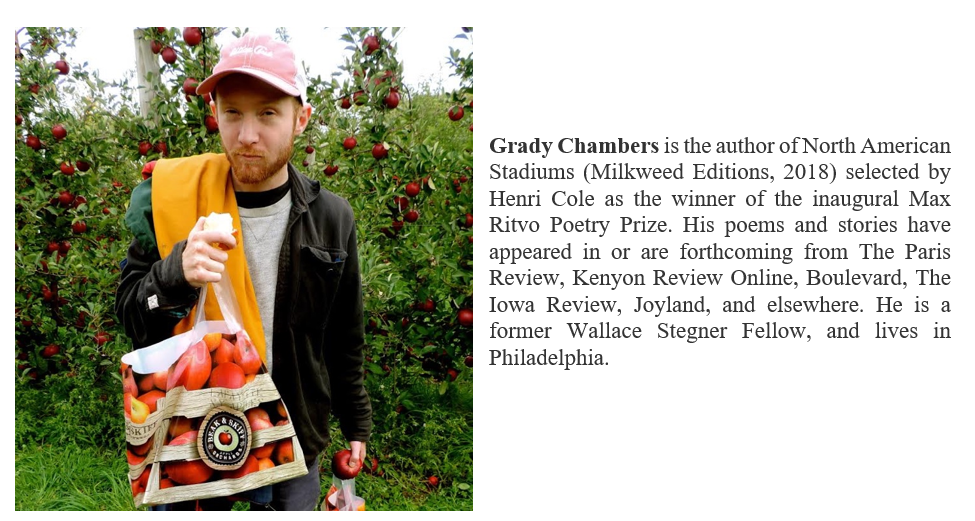Three Poems by Grady Chambers
************************************************************************
EVENING
Now I take the first sip.
This is my favorite hour,
long and brief,
when the city picks up steam,
the sky darkens,
the lights of skyscrapers come on
like embers,
everyone in motion,
traveling home.
There are certain evenings
it’s almost impossible to imagine
where a single person
will lie down to sleep, all that will have to happen for them
to get there. I might be on a bus,
or watching a theater empty. I try to imagine their front doors,
their hallways,
the beds in which they sleep. I think of their bodies
in those last paces, giving in,
or given willingly.
I remember names tonight,
childhood, the gymnasium’s hardwood floor,
Nick Brunell, skinny and handsome,
and what happened to him.
Evening descends. The light recedes from the city
like a tide. One man’s sleep seems lonely
where another’s doesn’t.
Those kids from school, we used to
crawl across each other’s bodies,
like ants in love. When the whistle blew
we’d divvy up like tribes,
parsing into teams by the colors of our shirts—
“blues are lights, greys is dark”
— the voices of children,
not making sense
but doing so perfectly.
Some evenings I pick a single person passing by
and in my mind I follow them home. I want their life,
in this manner, to become more real
to me, like a handprint in paint
on the schoolroom wall,
or time, or the memory
of the nurse’s gloved hands
pressing on my shoulders, the scissors’ whisper
in my ears. The children waiting
in the hallway. How I closed my eyes
while she cut my hair.
***********************************************
THE NEW APARTMENT
Clear morning, arriving early—
the movers called
to say the truck broke down—
we had time to kill.
The kitchen’s
unfilled drawers—
the burgundy tiles
grouped in diamonds
on the bathroom walls—
how gently we stepped
through the quiet
empty rooms,
as though we’d been given
a present to admire
meant for someone else.
Our junk, our lamps
and letters, our desks
and bed, our old arguments
cluttered in the truck,
following behind us.
And why shouldn’t we
undress in that bare room
at eleven on a Tuesday?
Why shouldn’t we be slow
with each other,
in the dusty
emptiness, the sunny floorboards
warm beneath our skin,
everything coming
not yet there.
***************************************************************
RED-EYE
There was something strange about the woman’s face—
like the skin of someone else
had been sewn on top her own.
To practice compassion,
I made myself gaze at her,
this Distinct Living Entity—
two lives—hers and mine—but one.
On the jet-bridge, I fell in love
with the voice of the girl
behind me, then despised her
as I watched her fill a whole
overhead bin with her guitar.
The lights dimmed. The pilot spoke
soothingly through the speakers.
I walked the aisle in my socks.
The Second Door of Liberation
is singleness—a cloud
turns to mist. You could tell
who was truly sleeping
by their faces, how they softened
and seemed to fill
with something soft, terrible
to gaze upon.
On the lavatory seat
I felt the warmth of the thighs
of the boy who had gone before me.
In my seat, I heard a man say
If we go down, at least we go in flames.
Beneath us, Nebraska.
I sat behind a woman speaking softly
to the younger woman beside her.
She had people, she said,
in Cleveland. By people
she meant family.
She was on her way to them.
At dawn, the bald man
at the far end of the row
slid open the sleeve
of his window. It froze me,
the stack of colors stretched
like something torn
from a canvas. Night was dawn.
People woke. They yawned
in the faces of their companions.
They were given towels
to clean themselves. They smiled.
They emitted little noises
as they stretched. They gazed
through the windows, blinking,
tired. Their eyes were raw as the eyes
of the newly born. They looked
surprised, I thought, but that isn’t
what I meant—we lowered through
the cloud. A city rose beneath us.
It was an ordinary morning.
They appeared grateful.
